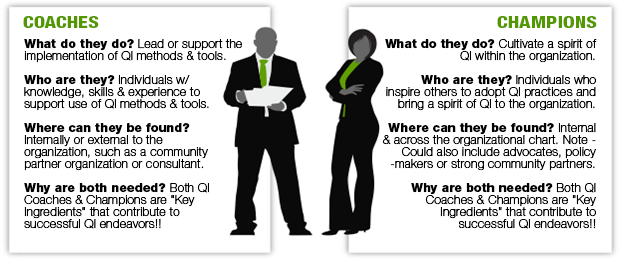Introduction

Quality leaders at all levels of the organizational chart are needed to build and sustain quality improvement (QI) culture. For example, at the organization level, QI leaders must execute strategies to weave QI into the fabric of the organization (e.g., QI plans and policies), whereas at the program level, QI leaders are relied on to lead improvement projects in the face of adversity.
Two important QI leadership roles, the QI coach and QI champion, are often referred to in public health circles. This article will describe the role and necessity of QI coaches and champions and will provide examples from PHQIX submissions, highlighting examples of QI leaders in action.

Although important distinctions can be drawn between coaches and champions, what is most important is that the roles and responsibilities of both are carried out in every agency.
WHAT IS THE ROLE OF A QI COACH OR CHAMPION?
QI coaches use a variety of skills and tools to facilitate meetings, help teams set goals, establish measures, design improvement tests of change, and study results. Coaches may be asked to support the project from start to finish or provide support as needed. The role of a coach will also vary based on the skills, abilities, and experience of other individuals involved and the scope of the improvement project. (1)
QI champions cultivate a spirit of QI within the organization that encourages continuous improvement of services and programs by providing a strong endorsement for QI and participating in QI activities (training, projects, etc.). QI champions are the organization's QI cheerleaders or inspirational leaders! According to the Minnesota Department of Health: "Ideally, (champions) should have training, knowledge and experience with QI, but at a minimum they need to be committed to leading QI efforts and helping others get involved and interested." (2)
WHO ARE QI COACHES AND CHAMPIONS?
QI coaches have the knowledge, ability, and experience to support QI project teams as they navigate through the steps of a defined improvement process such as Plan, Do, Study, Act. A proposed set of prerequisite knowledge and experience for a QI coach may include QI methods and tools, leadership and team building, change management, performance management, and group facilitation. Coaches should also have the time and budget to support the demands of QI project teams. QI coaches should also have access to QI resources such as books, journals, and a network of other QI leaders or coaches. (1)
QI champions are people who inspire others to adopt QI practices and bring a spirit of QI to the organization. Special training and experience are not typically required of QI champions. Because the QI champion role does not require advanced training, skills, or time, QI champions may be found at any level of the organizational chart. In fact, if you’re reading this article, there’s a good chance you’re a QI champion, too!
WHY ARE QI COACHES AND CHAMPIONS NEEDED?
Recent publications from national public health QI leaders point to the need for QI coaches and champions:
- Key ingredients that contribute to successful QI endeavors include selecting experienced, objective facilitators and identifying internal champions, teams, and team leaders. (5)
- Training agency leaders in change management and how to be a QI champion will advance QI use in local health departments. (6)
- Building a culture that supports QI includes several factors, including leadership, application of a proven QI method, and champions. If you want quality to be in the fabric of your organization, your organization must have the capacity to use proven QI methods. (7)
- QI coaching has been shown to play a critical role in the change process—one that helps organizations harness the knowledge and creativity of front-line teams to make lasting improvements in core processes. (1)

WHERE CAN YOU FIND QI COACHES OR CHAMPIONS?
Some organizations have filled the role of QI coach internally by identifying qualified candidates and investing in the development of their QI knowledge and skills through training. Others have looked externally to a public health system partner or consultant. The National Association of County and City Health Officials (NACCHO) has developed a resource to help identify a QI consultant, found below. A consultant can help expedite the process to train staff and leaders or develop internal training capacity by training the trainer. Agencies have hired QI consultants from national or private organizations or have partnered with universities or public health institutes with QI or performance management expertise. (3)
QI champions, unlike QI coaches, are usually found within the organization. To find organizational QI champions, NACCHO encourages local health departments to identify staff with existing QI knowledge, experience, or expertise and engage them as QI champions. If existing staff members do not have these characteristics, seek staff members who exhibit characteristics of natural QI champions: those who have an established reputation as early adopters, innovators, natural leaders, and analytical thinkers. (4)
LEARNING FROM PHQIX SUBMISSIONS
The following examples are intended to highlight the role and necessity of quality leaders to carry out effective improvement projects.
Agency: Tacoma-Pierce County Health Department (TPCHD)
Year: 2010
How did the team from TPCHD use a QI coach or champion?
The main driver of success in this project was having a consistent process champion to support elements of the initiative. The agency QI coordinator provided technical assistance on group process and QI methods and tools throughout the project period.
Why is this important?
By using a skilled QI coach for technical assistance throughout the project, TPCHD achieved an increase in average quarterly billings of Medicaid administrative match dollars of around 300% (from about $250,000 to $750,000) in average quarterly billings.
Agency: Cabarrus Health Alliance (CHA)
Year: 2010–2011
How did the team from CHA use a QI coach or champion?
CHA benefited from technical assistance and training from a partner organization (North Carolina State University), as well as an internal QI project champion.
Why is this important?
With internal (QI champion) and external (QI coach) support, the QI team reduced the average cycle time for the complete Women, Infants, and Children Program visit by 25%. Also, as a result of this unique partnership, staff received valuable training and experience in the Lean Kaizen methodology and learned how to use different QI tools, such as the Gemba walk and value-stream map.
Improving WIC Open Access Appointment System
Agency: Sullivan County Public Health Services (SCPHS)
Year: 2012–2013
How did the team from SCPHS use a QI coach or champion?
The agency's public health nurse supervisor had been tracking maternal-child health (MCH) referrals for years and tried multiple strategies to increase referrals. She convinced the management team that a QI initiative could harness additional resources to achieve measurable improvement in this area. The agency applied for and received training through a Community of Practice for Public Health Improvement grant.
Why is this important?
With the knowledge and skills gained through training, the public health nursing supervisor led a team that achieved measurable improvement related to MCH referrals from community providers.
For more information, consider reviewing some of the resources cited in this article:
- Weitzman Institute. (2013, August). Quality improvement coaching (website). Retrieved from http://quality.chc1.com/echo/coaching/
- Minnesota Department of Health. (n.d.). How to develop a QI plan (website). Retrieved from http://www.health.state.mn.us/divs/opi/pm/lphap/qiplan/howto.html
- National Association of County and City Health Officials. (n.d.). Engaging a quality improvement consultant. Retrieved from http://www.naccho.org/topics/infrastructure/accreditation/upload/Engaging-a-QI-consultant-FINAL.pdf
- National Association of County and City Health Officials. (2012). Roadmap to a culture of quality improvement. Retrieved from http://qiroadmap.org/wp-content/uploads/2013/01/QIRoadmap.pdf
- Public Health Foundation. (2014, June). Key ingredients in public health QI. Retrieved from http://www.phf.org/resourcestools/Documents/Key_Ingredients_for_QI_Success.pdf
- Davis, M. V. (2012, June). Building theory: Creating a QI culture. Presented at AcademyHealth Public Health Systems Research Interest Group Annual Meeting. Retrieved from http://www.academyhealth.org/files/phsr/4-Davis.pdf
- Tews, D. S., Heany, J., Jones, J., VanDerMoere, R., & Kusuma, M. (2012, January). Embracing quality in public health: A quality improvement practitioner's guidebook (2nd ed.). Retrieved from https://www.mphiaccredandqi.org/wp-content/uploads/2013/12/2012_02_28_Guidebook_web_v2.pdf
Citation
Kane, T. The Role and Necessity of Quality Leaders in Public Health. Fri, 02/05/2016. Available at https://www.phqix.org/content/role-and-necessity-quality-leaders-public-health. Accessed 04/16/2024.